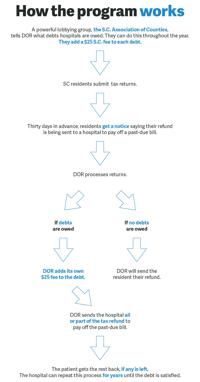A loophole lets SC hospitals take millions from residents’ tax refunds for unpaid bills
April 20, 2019
South Carolina hospitals are using a loophole in state law to scoop millions of dollars a year from the pockets of the poorest of patients. It mostly takes place outside the courts and the public eye.
A law originally written to help state and local governments collect debts is being used to seize tax refunds from people with past-due medical bills. The S.C. Department of Revenue does the legwork, and the cash flows straight into the coffers of some of the region’s largest health care companies.
The payoff is huge.
Together, health organizations took at least $92.9 million in more than 172,000 seizures to pay off past-due medical bills in 2017. The state and a private lobbying group for South Carolina’s counties make millions more helping hospitals collect these debts from people’s tax refunds. Patients foot the bill for that work, with as much as a $50 fee tacked onto their debt, giving both groups a boost.
These little-known mechanisms, the Setoff Debt Program and another that collects citizens’ wages, allows select hospitals to use the Revenue Department as their debt collector if it can show ties to state or county governments. Those ties, however, are often tenuous.

Over time, private companies have come to dominate this program, which was intended to help governments settle overdue bills and recoup taxpayer dollars. In fact, money collected by the hospital systems now dwarfs what local governments collect.
It’s an unusual arrangement. Only one other state, Minnesota, allows private hospitals to claim its citizens’ tax refunds, according to an investigation by The Post and Courier.
Details about the program are a closely held secret. The Post and Courier first contacted the Revenue Department a year ago seeking information on the agency’s collections for hospitals. The Revenue Department slow-walked that public records request for months before eventually releasing documents that show hospitals’ use of the Setoff Debt Program had increased 18 percent between 2015 and 2017.
Hartley Powell, director of the Revenue Department, insisted there are no transparency concerns. He said the Setoff Debt program is effective in helping government entities “better fund essential public services.” He contested that private hospitals are allowed access to it.
Meanwhile, hospitals that don’t qualify for the program say the practice gives their competitors an unfair advantage.
Patients often aren’t aware the program even exists until their tax refund check goes missing and they find themselves trying to navigate a complicated system with little recourse for debtors.
